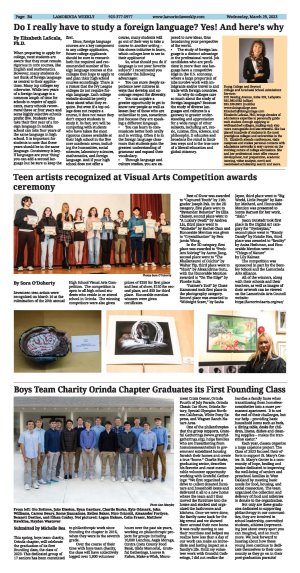| | Published March 29th, 2023
| Do I really have to study a foreign language? Yes! And here's why
| | | By Elizabeth LaScala, Ph.D. |  | | Doing College and Beyond College and Graduate School Admissions Services 970 Dewing Avenue, Suite 202, Lafayette 925.385.0562 (office) 925.330.8801 (mobile) www.doingcollege.com Elizabeth@doingcollege.com Elizabeth LaScala, PhD, brings decades of admissions expertise to personally guide each student through applying to well-matched colleges, making each step more manageable and less stressful. She has placed hundreds of students in the most prestigious colleges and universities in the US. Elizabeth attends conferences, visits campuses and makes personal contacts with admissions networks to stay current on the evolving nature of college admissions. She and her professional team offer resume development, test preparation, academic tutoring, value analysis, merit and need-based scholarship search and more. |
When preparing to apply for college, most students are aware that they must remain rigorous in core courses, like English and mathematics. However, many students do not think of foreign language as central to their applications. Many top colleges say otherwise. While two years of a foreign language is a common length of time for schools to require of applicants, many schools recommend three or four years and some highly selective schools prefer five. Students who take their first year of a foreign language in middle school can take four years of the same language in high school. It is important for students to note that these years should be in the same language. Consistency is key. If languages are your `thing' you can add a second language but be sure to keep the first.
 Since, foreign language courses are a key component to any college application, future college applicants should be sure to research both the required and recommended number of foreign language courses at the colleges they hope to apply to and plan their high school courses accordingly. There is a rumor that the Ivy League colleges do not require foreign language. Each college website should be pretty clear about what they require. But even if a top college does not require a course, it does not mean they don't expect students to study it. In fact, you will be competing with students who have taken the most rigorous classes available at their high school in the five core academic areas, including the humanities, social sciences, laboratory sciences, mathematics, and foreign language. And if your high school does not offer a course, many students will go out of their way to take a course in another setting - this shows initiative to learn, which colleges love to see in their applicants!
Since, foreign language courses are a key component to any college application, future college applicants should be sure to research both the required and recommended number of foreign language courses at the colleges they hope to apply to and plan their high school courses accordingly. There is a rumor that the Ivy League colleges do not require foreign language. Each college website should be pretty clear about what they require. But even if a top college does not require a course, it does not mean they don't expect students to study it. In fact, you will be competing with students who have taken the most rigorous classes available at their high school in the five core academic areas, including the humanities, social sciences, laboratory sciences, mathematics, and foreign language. And if your high school does not offer a course, many students will go out of their way to take a course in another setting - this shows initiative to learn, which colleges love to see in their applicants!
 So, what should you do if language is not your favorite subject? I recommend you consider the following advantages:
So, what should you do if language is not your favorite subject? I recommend you consider the following advantages:
 - You can more deeply experience new cultures in ways that develop and encourage respect for diversity.
- You can more deeply experience new cultures in ways that develop and encourage respect for diversity.
 - You can acquire a greater opportunity to get to know new people as well as lessen fear of those who are unfamiliar to you, sometimes just because they are speaking a different language.
- You can acquire a greater opportunity to get to know new people as well as lessen fear of those who are unfamiliar to you, sometimes just because they are speaking a different language.
 - You can learn to communicate better both orally and in writing. Often it is in the foreign language classroom that students gain the greatest understanding of grammar and expand their vocabulary.?
- You can learn to communicate better both orally and in writing. Often it is in the foreign language classroom that students gain the greatest understanding of grammar and expand their vocabulary.?
 - Through language and culture studies, you are exposed to new ideas, thus broadening your perspective of the world.
- Through language and culture studies, you are exposed to new ideas, thus broadening your perspective of the world.
 - The study of foreign language is a distinct advantage in the professional world. Job candidates who are proficient in more than one language have a competitive edge in the U.S. economy, where a large proportion of jobs involve work with immigrants and/or travel to and trade with foreign countries.
- The study of foreign language is a distinct advantage in the professional world. Job candidates who are proficient in more than one language have a competitive edge in the U.S. economy, where a large proportion of jobs involve work with immigrants and/or travel to and trade with foreign countries.
 So why do colleges care so much about the study of foreign languages? Because the study of diverse languages and cultures is a gateway to greater understanding and appreciation for a wide range of other subjects, including art, music, cuisine, film, science, and philosophy. It educates and broadens the mind in limitless ways and is the true core of a liberal education and global citizenry.
So why do colleges care so much about the study of foreign languages? Because the study of diverse languages and cultures is a gateway to greater understanding and appreciation for a wide range of other subjects, including art, music, cuisine, film, science, and philosophy. It educates and broadens the mind in limitless ways and is the true core of a liberal education and global citizenry. |
| | | | | | | | | | | | |



